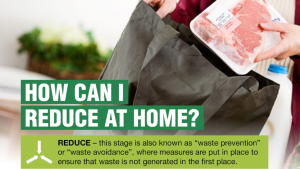
What is waste minimisation?
Waste should be handled according to South Africa’s Waste Management Hierarchy
– this means choosing to reduce,
reuse or recycle materials as many times as we can before disposing of waste.
The 3R’s: Reduce Reuse and
Recycle are ways to minimise the amount of waste going to
disposal/landfills.
Only waste that cannot be reused, composted or recycled will end up in the waste stream (black bag) and go to the disposal/landfill site.
REDUCE

- This stage is also known as "waste prevention" or "waste avoidance", where measures are put in place to ensure that waste is not generated in the first place.
- Avoid using disposable or ‘single-use’ products, such as disposable plates and cups, razors and bottled water. Consider buying a glass/metal water bottle and flask for drinks instead of purchasing take-away cups.
- Avoid buying products that have lots of packaging.
- Use reusable carrier bags rather than disposable bags.
- Buy only what you need and consider buying food or household products in bulk, refills or concentrates, as these generally require less packaging.
- Buy local products, as these generally require less packaging and fuel for transportation.
- Limit your purchases of perishable food. This may mean going to the grocery store more often and buying less food each time. Plan meals before shopping.
- Freeze or preserve foods and check expiry dates before purchasing.

RE-USE
- This stage involves separating articles from the waste stream, checking, cleaning, repairing, refurbishing and re-using whole items or parts of items for use in similar or different purposes without changing its form or properties.
- Donate unwanted gifts, clothes, furniture, toys or books to friends or charities. Books can be donated to schools and libraries or taken to book exchange shops. Clothes and other useful items can be donated to the homeless through charity organisations or churches.
- Re-use a plastic or material bag instead of buying a plastic bag for your shopping.
- Repair items such as clothes, shoes and toys rather than throwing them away. There are many businesses in the NMBM that specialize in repairs.
- Return glass bottles to shops for reuse.
- Store food in reusable containers rather than non-recyclable clingwrap or foil.
- Give spare/left-over food to someone in need.
- Re-use scrap paper as notepads.
- Use both sides of paper before recycling it.
- Re-use gift-wrap and other packaging.
- Find new uses for items:
- use plastic tubs / bottles / cartons as pots for planting seedlings;
- use glass jars / tins to store kitchen or craft items
RE-CYCLE

- This stage involves separating articles from the waste stream and processing them, thus changing their original form to inputs for new products and materials.
- Include shredding of PET bottles and using the material as inputs to the textile industry for the manufacture of pillows and clothing.
- Include plastic bottle caps used to manufacture boardwalk, benches, and litter bins.
- Composting of organic materials.
.png)
Please click here to view a map of the drop-off points
What can I compost @ home?
- "Browns" (carbon-rich materials), which include: Fresh leaves, coffee grounds, newspaper strips, sawdust, straw, fruit scraps, bark, pine needles, tea bags, eggshells.
- "Greens" (nitrogen-rich materials), which include: Food waste, vegetable peels, hay, grass clippings, garden waste.
- Browns and Greens should be layered or well mixed.
- Disposal / Landfill – this is the least preferred option where waste enters the lowest level of the hierarchy to be treated and / or disposed of, depending on the safest manner for its final disposal.
Did you know?
- Roughly one-third of the edible parts of food produced for human consumption is wasted globally, which is about 1.3 billion tons per year. The amount of food waste produced globally each year is enough to feed about 1 billion hungry people in the world.
- Every year, globally, 8 million metric tons of plastic end up in our oceans. This is equivalent to five grocery bags filled with plastic for every foot of coastline in the world (NCEAS, 2015).
- You grow the economy by recycling. It is estimated by the Department of Technology and Science that by diverting 20% of industrial and 60% of domestic can have an impact.
Long-term benefits:
- Eases the strain on South Africa’s natural resources.
- Helps to create employment in the informal and formalised waste reclamation sectors.
- Influences the Green Economy.
- Positive effect on Climate Change.

SUBSCRIBE TO RECEIVE MORE INFORMATION




